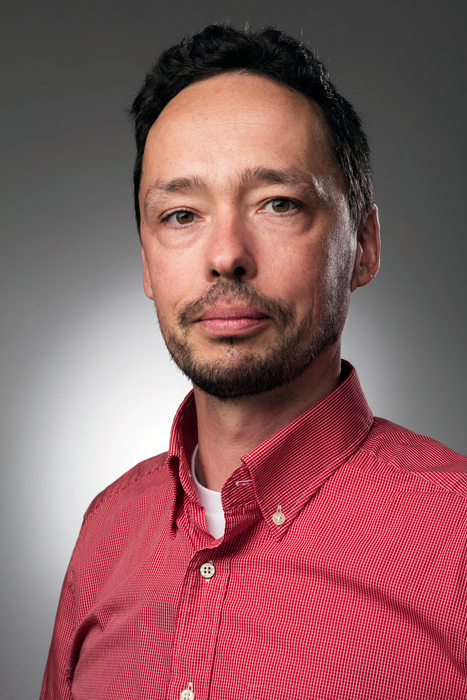Interview with Head of the Department of Journalism Filip Láb
"Graduating from Erasmus Mundus Master‘s in Journalism, Media and Globalisation Equals Studying Two Master’s Degree Programmes at Once", says Filip Láb
The Institute of Communication Studies and Journalism at the Faculty of Social Sciences is a new member to the consortium of the programme of Journalism, Media and Globalisation, owing to the success of this year’s approval round of applications for gaining support in the international programme of the joint Master’s study of the Erasmus Mundus Joint Master Degrees. Information on the study within this programme and advantages and benefits connected with its graduation, is given by Filip Láb, the guarantor of the programme and head of the department of journalism at ICSJ FSV UK.

FSV UK has recently joined the Erasmus Mundus Media and Globalisation programme. You must be happy about this success.
I am. Erasmus Mundus Master’s in Journalism, Media and Globalisation is a long-standing traditional programme in the area of media and communication studies that has been in place since 2005. That’s why I am very glad that the Faculty of Social Sciences, specifically our institute, has managed to become involved and receive funding for the next period 2020-2025. At the moment the first applicants are applying and we are preparing the first round of the admission procedure for students coming from abroad next autumn.
What is the structure of the study itself?
Students complete their first year of master’s degree with a programme coordinator in Denmark, at the University of Aarhus and the Danish School of Media and Journalism. Here they gain a general basis. For the second year of study, they subsequently choose one of the specializations that they can study at various universities according to a wide choice of focus. This year we have had to reduce their offer due to the uncertain situation around Brexit because two partner universities are located in Great Britain. This year we thus offer a specialization at the University of Amsterdam and a specialization here at the Faculty of Social Sciences. There is still a lot to choose from.
What makes this Erasmus Mundus programme unique?
Besides the great tradition already mentioned above, the programme is unique in the opportunities it offers. In addition to classic partners, we also have the so-called non-degree partners, i.e. partner universities, where students can go on a shorter internship during their first year. These include interesting and prestigious universities, such as the University of Berkeley in California, the Catholic University of Chile, and the University of Technology Sydney. In practice, students may come to study at Aarhus and during the first year of study they have the opportunity to take an internship, for instance in Berkeley, without having to retake the admission procedure, which is a fantastic opportunity that many programmes do not offer.
What specializations can students choose from?
Specialization here at FSV UK focuses on media in post-totalitarian society. Within this specialization we focus on exploring transformation processes from totalitarianism towards democracy, i.e. on how they work, what impact they have on the media landscape, and what implications they have for media freedom in the given country. Understandably, the programme illustrates all these phenomena on the events in Central European space. However, it is conceived to offer a universal outreach, so that - for example - a student from Latin America may take from his or her study general knowledge of what these transformation processes entail, what are the risks there, etc.
And a specialization at the University of Amsterdam?
It is a specialization in Politics & Communication. It focuses on the key issues of today, such as European integration, climate change, the rise of populism and electoral polarization, from the journalistic point of view. Attention is also paid to the issue of the legitimacy of the journalist profession, the issue of fake news and also new forms in the journalistic profession, such as data journalism. In the second year of specialization, students undertake many internships and excursions. In the past, they visited – among others - the European Commission, NGOs in Brussels, the World Press Photo exhibition, the Dutch Institute for International Relations (Clingendael) and the International Criminal Court (ICC).
What are the requirements for the admission procedure?
The main requirement is knowledge of English, the applicants can be waived the tests only if they completed the entire previous bachelor’s degree study in English. Emphasis is also placed on rich journalistic practice. We want students to come to us already with some experience from within the field, whether it be work for the media, but also for the public administration, private or non-profit sector in the field of communication.
What degree will the graduates have?
The programme is concluded with a master’s degree in both specializations, i.e. from the University of Aarhus and the Faculty of Social Sciences.
What are the main benefits of graduating from the programme of Erasmus Mundus Media and Globalisation?
The general advantage of joint double degree programmes is that you have much more varied study experience from several universities. Moreover, in particular this programme combines some of the most prestigious teaching and academic workplaces operating in the fields of the media and communication. It is no exaggeration to say that graduating from this programme equals studying two master's degree studies at once. Therefore, if you are looking for a study which will give you, besides good-quality education, great practical experience from abroad, this programme is the right choice for you.
Thank you kindly for the interview.
The interview was led by Jakub Říman, spokesperson of FSV UK





